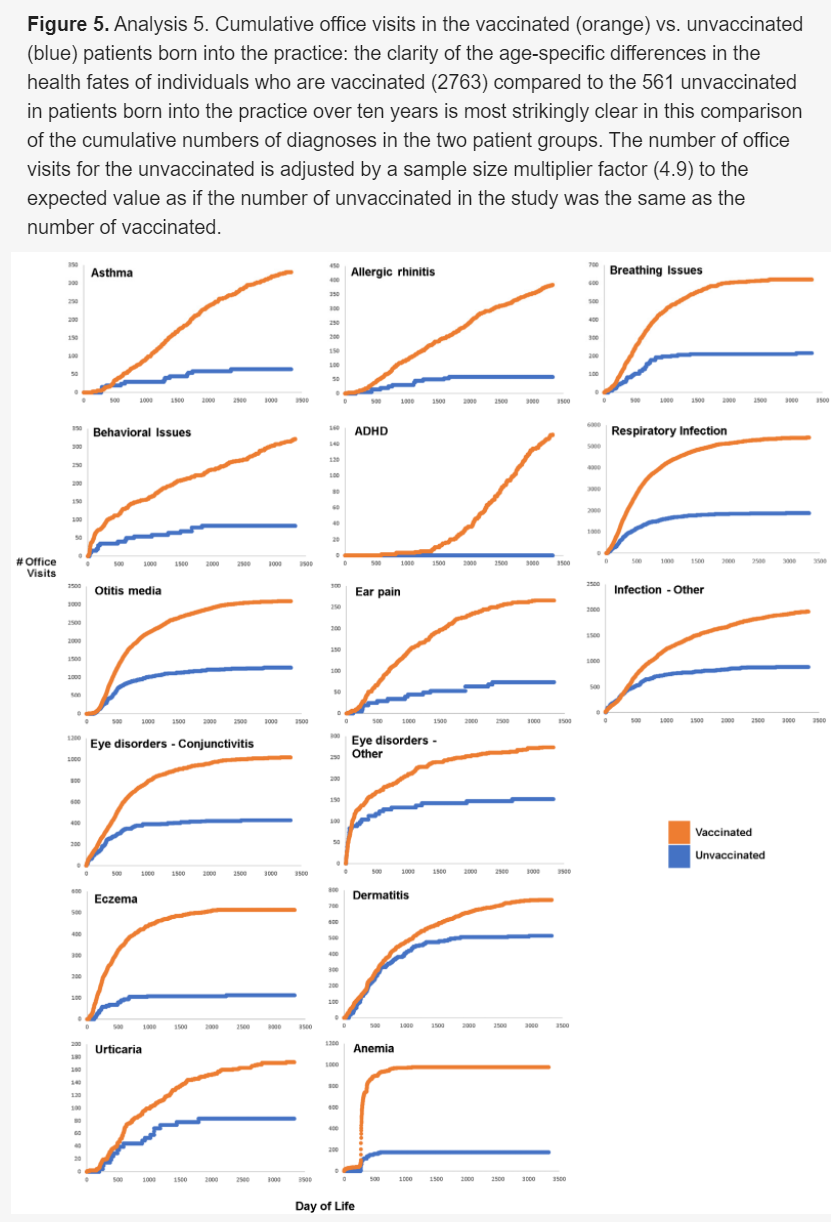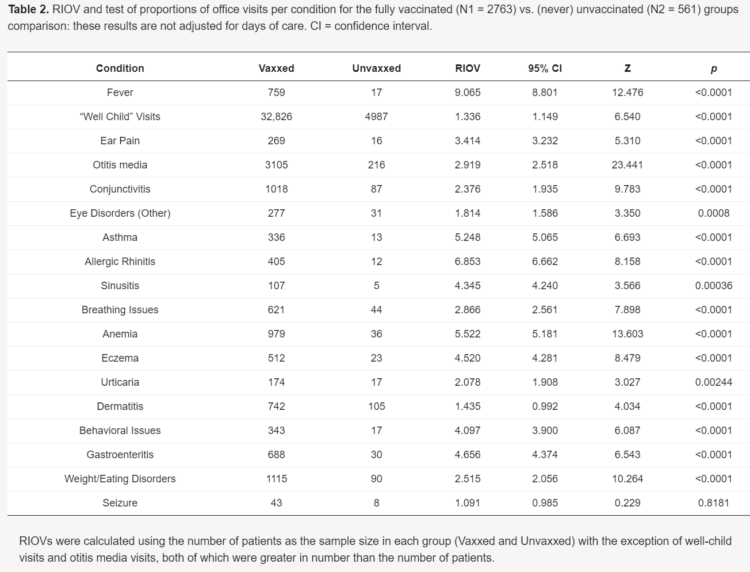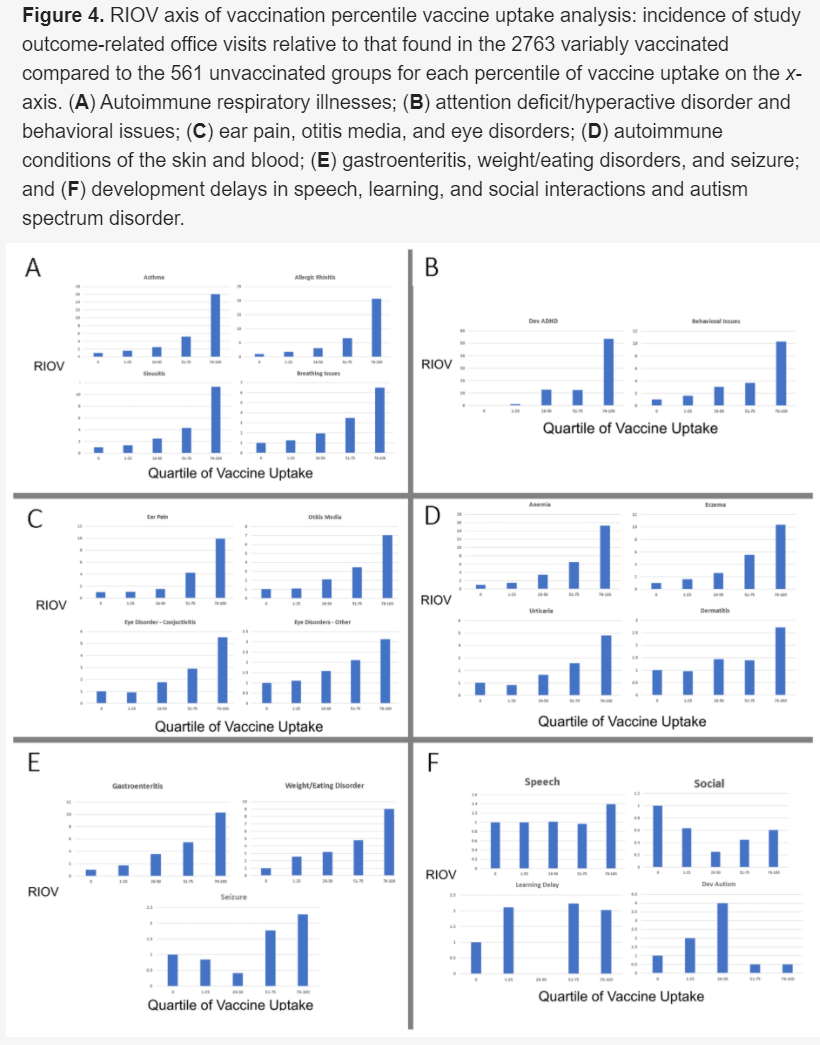Ten Year Study: Unvaccinated Children Far Healthier Than Their Vaccinated Peers
by: Kevin Alfred Strom | Published: December 15, 2020

Dramatic graph showing pediatric office visit rates triggered by various illnesses in both vaccinated (orange) and unvaccinated (blue) children. In no case were vaccinated children healthier in these metrics — in fact, the exact opposite was true.
THE CENTERS for Disease Control (CDC), the Department of Health and Human Services (HHS), and the National Institute of Health (NIH) refuse to conduct any study comparing the unvaccinated child to his/her peers. While HHS is legally obligated to conduct safety studies every two years and report to Congress in accordance with the 1986 National Childhood Vaccine Injury Act, it was admitted in a 2018 court ruling that none of these vaccine safety studies were ever conducted over a thirty year span.
This medical fraud has enabled the rise of a predatory vaccine industry and a growing number of “recommended” childhood vaccinations. However, as childhood vaccinations increase, the health of American children has not improved in the past thirty years and respiratory infections are rampant. Visits to the pediatrician have skyrocketed, with chronic health issues becoming a normal way of life for many. A whopping 54 percent of children and young adults in the U.S. now suffer from chronic illnesses that lead to life-long pharmaceutical prescriptions.
Ten-year study finds that unvaccinated children are healthier in several metrics and enjoy 25 times fewer pediatric visits
A new study published in the International Journal of Environmental Research and Public Health finds that unvaccinated children are far healthier than vaccinated children. As the rate of vaccination increases, so do chronic health issues such as asthma, allergic rhinitis, respiratory infections, eczema and a host of other health problems. The study, titled, “Relative Incidence of Office Visits and cumulative Rates of Billed Diagnoses Along the Axis of Vaccination” shows how childhood vaccination causes an increasing number of pediatric visits and an influx of diagnoses. The research followed 3,300 pediatric patients for ten years and was conducted at Integrative Pediatric, a pediatrics practice in Oregon run by Dr. Paul Thomas, M.D.

RIOV (relative index of office visits) for various illnesses (the chart also includes “well child” visits for comparison): The RIOV number is a multiplier indicating how much more susceptible vaccinated children are to these conditions.
During the study, Thomas’s pediatric practice prioritized parental decision-making and followed the informed consent doctrine of the American Medical Association. The plan allows parents to stop or delay vaccination if vaccine injuries were present. Not every child processes vaccine ingredients in the same way; conditions like eczema, developmental delay, allergies, or autoimmune conditions are typical signs that a child’s body is unable to process the vaccines. Dr. Thomas’s practice contained the perfect mix of children who ranged from being unvaccinated to partially vaccinated to “fully vaccinated” per the CDC’s guidelines.
The study found that the unvaccinated child shows fewer signs of respiratory infections and fewer fevers at well-child visits, among many other disparities. The unvaccinated child required twenty-five times less pediatric care over a ten year span. The CDC pushes 70 doses of 16 vaccines on every child before he or she reaches the age of 18. Children who received 90 to 95 percent of the CDC-recommended vaccines for their age group were about 25 times more likely to see the pediatrician than the unvaccinated group.
Vaccinated children (with a family history of autoimmune issues) suffer more compared to their unvaccinated peers
An important feature of this study was Dr. Yehuda Shoenfeld’s work, which singled out a predisposition to vaccine injury called autoimmune syndrome induced by adjuvants (oil emulsions, aluminum salts and other chemicals, and “inactivated toxins,” designed to irritate and thereby increase the body’s immune response). If there is family history of autoimmunity, children who get vaccinated are more likely to suffer from ear infections, asthma, allergies, and skin rashes, when compared to the unvaccinated who also share the same family history of autoimmune issues. The aluminum adjuvant and the other various chemicals in the vaccine may activate the genes that enable autoimmune issues. Family history of disease is important in determining whether vaccines should be used in the child.
Vaccinated children up to six times more likely to suffer from anemia, allergies, sinusitis, and asthma
The most concerning aspect of the study was the rise in chronic health issues among the vaccinated children. The vaccinated children were three to six times more likely to wind up in the pediatrician’s office to treat anemia, allergies, sinusitis, and asthma. The vaccinated were also 70 percent more likely to suffer from various respiratory infections compared to the unvaccinated. Do the vaccines weaken overall immunity and make children more susceptible to other infections?

This series of charts shows relative incidence data for numerous diseases for the unvaccinated versus quartiles of vaccine uptake. You may be surprised to see an apparent variation from the general trend of this study in the last two columns of the autism chart (the last chart in section F). This is likely a flaw in the data caused by parents (understandably) ceasing vaccination upon signs or symptoms of autism.
No ADHD in the unvaccinated
There was absolutely no ADHD in the unvaccinated children, but as vaccination uptake increased, ADHD and behavioral issues increased. Thomas’s practice halted vaccination when signs of ADHD were prevalent, which is why his practice saw roughly half the rate of ADHD overall, when compared to the general population. (This halting of vaccination also means that vaccine-related ADHD risk is likely even greater than indicated in the study.)
Vaccine-preventable illnesses were not prevalent in the vaccinated or the unvaccinated
Strangely, or perhaps not so strangely, a quarter percent of the vaccinated were diagnosed with infections that the vaccines were supposed to prevent, including chicken pox or whooping cough. A slight uptick in chicken pox and whooping cough was observed in the unvaccinated too, but they all recovered and gained lifelong immunity to the infections. There were no cases of measles, mumps, rubella, tetanus, or hepatitis for the children who were vaccinated. But there were also no cases of these infections in the unvaccinated during the entire 10.5-year study period. This brings up the question: Are vaccines even necessary, or do they impose a burden of unnecessary harm to children?
Source: International Journal of Environmental Research and Public Health (archived version here) via Natural News and National Vanguard correspondents.
Tags: Date-2020-12-15, Vaccines, TheBigCovidLie
This page may have a talk page?.
Access and use of this site by any means implies consent to the Agreement of Use. © Hellene Sun
